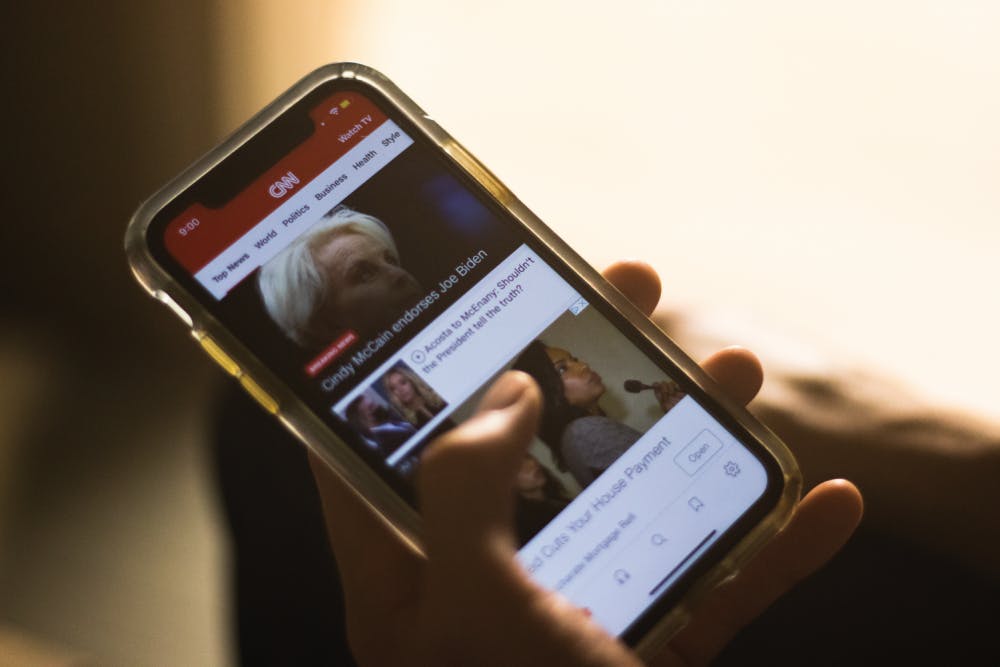A raging pandemic, police brutality, catastrophic wildfires and a contentious presidential election: every time we log on to social media or read our favorite news site, we’re bombarded with these emotional stories and painful images of the world around us. But it’s tough to stay away, even when the content we consume is stressful. The desire to be informed citizens can cause us to push through the negative feelings and keep on scrolling.
However, studies have shown that watching the news and exposing ourselves to social media can be detrimental to our mental health. A growing body of research suggests that daily consumption of news negatively affects mental health, especially when the person watching the news finds it relevant to their own life. Social media is a top offender, too—even more so during a crisis. In fact, a recent study by researchers in China found that the prevalence of depression and anxiety ran much higher in people who consumed social media frequently during the COVID-19 outbreak compared to the population who consumed it prior to the outbreak.
It’s helpful to limit our consumption of news and social media during such a tumultuous time, but it’s not realistic just to tune out all news and pretend the stressors don’t exist. Here are a few ways to stay informed while managing your mental health.
Catch yourself when you’re ‘doomscrolling’
You may have heard the term “doomscrolling” recently. Merriam-Webster actually wrote about it this year, but stopped short of adding it to the dictionary. The company defines doomscrolling as “the tendency to continue to surf or scroll through bad news, even though that news is saddening, disheartening or depressing,” which is exactly what many of us have been doing throughout 2020.
Doomscrolling isn’t just casual surfing, according to Healthline. It’s an obsessive relationship with negative news that leads to heightened anxiety but makes it a struggle to tear yourself away from the screen. When you feel yourself starting to get anxious, try switching apps to something lighter. A mobile game or a text to a friend can ease you out of your scrolling spiral.
Limit the time you spend online
Don’t give up on the news for good, though. We’re living in hugely important times right now. While the world can feel uncomfortable or even terrifying, that means we may finally be able to start moving forward on some of the systemic issues we face as a nation. It can be tough to balance staying informed and staying mentally well, though, so try putting a timer on it. Half an hour on reputable news sites (more on that later) should be enough for you to glean what’s most pressing.
And when it comes to social media, Dr. Patricia Celan, a psychiatry resident at Dalhousie University in Canada, told Healthline that she recommends just a short stint every day.
“Instead of trying to stop doomscrolling, limit it,” Celan said. “Set yourself a timer every time you decide you’re about to start scrolling for updates, stopping at five to 15 minutes. That way you can feel informed while letting go before you begin to feel overwhelmed.”
Find a few news sites that you trust
It’s no secret that the social media industry is a major player in news dissemination, but it’s also where your grandma shares fake news and where your friends post screenshots on their stories and call it activism. Perusing social media is not a reliable way of getting objective, factual information. To combat that, try selecting a few reputable news organizations to rely on instead.
Some of the most well-respected outlets include Associated Press News, Reuters or NPR for national and global news, and you should subscribe to your local newspaper for close-to-home coverage, too. You could also find an unbiased podcast or newsletter that delivers the most important stories of the day and let that be your main source. Try The Daily or TheSkimm.
Check in with yourself before you consume….
It’s unfortunate that we live in an era where we need to do this, but take some time to assess how you feel before you check the news or scroll through Facebook. (Are you in the right headspace to receive information that could possibly hurt you?) Seriously, though, it’s important to make sure that you have the emotional bandwidth to handle potentially disastrous stories or watch traumatic videos.
...and after you consume
Ground yourself after you read the news, especially if you came across something anxiety-inducing. Try spending time in nature, going on a socially-distanced walk with a friend, cooking a meal, reading a lighthearted book or practicing self-care in whichever way works best for you. It’s important to mentally refresh so you avoid sitting on negative emotions all day.
Do something to help the causes you care about
It’s normal to question whether unplugging is the best idea right now. If we stay away from social media, we’ll be uninformed, and then we can’t really help make change, right? Well, consider this: sharing social media posts or forcing yourself to watch traumatizing videos isn’t actually helping, and raising awareness means nothing if there is no follow-through. Sometimes, that performative activism can even harm marginalized communities.
You can take a break from the posting and doomscrolling and still help out, which can alleviate your fear of ignoring the crises by unplugging. Sign petitions to support the Black Lives Matter movement, email your representatives about the COVID-19 response you want to see, donate to relief funds for those affected by dangerous weather and register to vote. These steps will make a much greater impact while protecting your mental health. Besides, how can you expect yourself to fully engage if you’re too stressed to stop scrolling?





